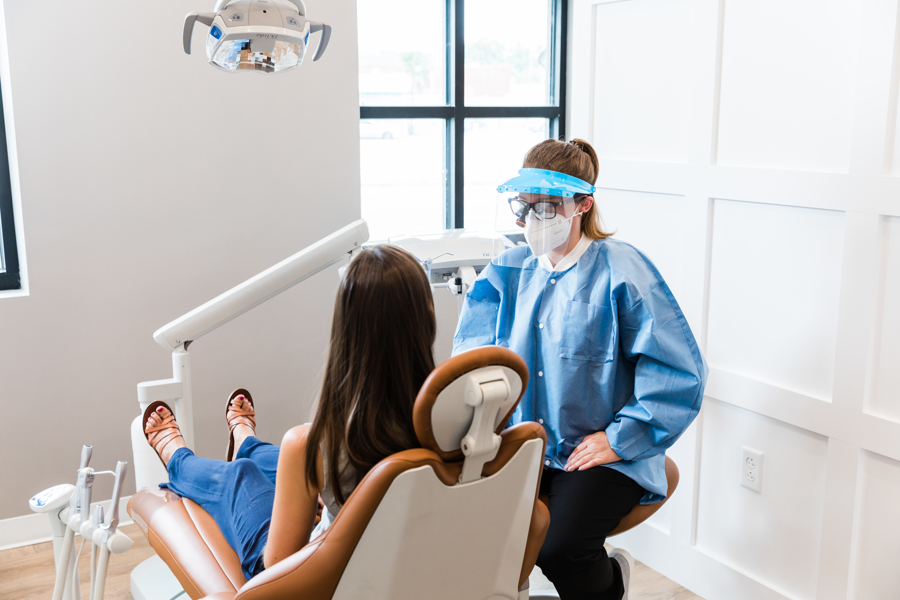A Guide to Common Dental Problems That Need a Dental practitioner's Care
Comprehending the series of dental conditions that necessitate expert care is paramount for keeping optimum dental wellness. Toothaches, for instance, can be symptomatic of severe concerns such as cavities, split teeth, or abscesses, each needing specific treatments like fillings or root canals. Periodontal disease, from the onset of gingivitis to much more serious periodontitis, highlights the value of normal dental exams and cleanings. In addition, affected wisdom teeth and jaw conditions can introduce substantial pain and complications. Guaranteeing timely brows through to the dental practitioner can alleviate these issues properly, however exactly what are the signs and treatments entailed?
Toothaches
Toothaches are a typical dental condition that can vary from light discomfort to extreme discomfort, often indicating an underlying problem that needs specialist attention. This pain can originate from a selection of sources, including oral cavities, fractured or fractured teeth, and oral abscesses. Each of these conditions positions substantial threats if left untreated, possibly resulting in much more severe problems.
Dental tooth cavities, likewise known as caries, are created by the buildup of plaque that wears down tooth enamel, causing openings or pits in the influenced teeth. Broken or fractured teeth, on the various other hand, might result from trauma, grinding, or biting right into tough objects. These architectural damages can expose the sensitive internal layers of the tooth, triggering pain and boosting the risk of infection. Abscesses are excruciating infections at the root of a tooth or between a tooth and the gum, generally arising from serious degeneration or untreated cavities.
Reliable therapy of toothaches entails addressing the source. This might consist of dental fillings for cavities, crowns for broken teeth, or root canals and prescription antibiotics for abscesses. Early intervention by an oral specialist can stop additional damage and reduce discomfort, making sure optimal oral health and wellness.
Gum Condition

The key reason of periodontal illness is bacterial plaque, a sticky, colorless movie that continuously forms on teeth. Poor dental health, cigarette smoking, genetic tendency, and specific medical problems, such as diabetes, can aggravate the threat of establishing periodontal disease. Regular dental check-ups are essential for early discovery and administration of this problem.
Treatment for gum condition varies from professional oral cleaning and scaling to even more advanced treatments like root planing and gum surgical treatment, relying on the severity. Keeping great oral health practices, including cleaning two times daily, flossing, and making use of an antiseptic mouth wash, can significantly lower the danger of gum tissue disease and advertise healthier periodontals.
Dental Caries
Cavities, additionally called oral caries, are a typical oral condition identified by the destruction of tooth enamel due to acid-producing microorganisms in the mouth. These bacteria prosper on sugars and starches from food and drinks, producing acids that slowly erode the enamel, resulting in dental caries development.
Early-stage cavities might disappoint symptoms, however as they advance, they can cause toothache, sensitivity to helpful site cool or hot, visible holes or pits in the teeth, and staining. If left untreated, dental caries can penetrate much deeper layers of the tooth, possibly resulting in extreme discomfort, infection, and also tooth loss.
Avoiding tooth cavities includes a mix of great oral hygiene methods and dietary practices. Routine brushing with fluoride toothpaste, flossing, and routine dental check-ups are critical. Dental practitioners might additionally advise added preventative actions, such as fluoride therapies and oral sealers, to safeguard teeth from decay.
Treatment for cavities relies on their extent. Small tooth cavities can be attended to with dental fillings, which recover the tooth's framework. If the decay has actually gotten to the tooth's pulp, much more advanced instances may require crowns or also root canal treatment. Prompt intervention by a dental professional is important to avoid complications and keep general oral wellness.
Impacted Knowledge Teeth
Influenced wisdom teeth are a prevalent dental issue that happens when the 3rd molars, frequently referred to as knowledge teeth, fall short to completely arise or align properly within the mouth. This condition often arises from inadequate room in the jaw or an irregular growth angle of the teeth. Affected wisdom teeth can lead to a selection of issues, including pain, infection, and damage to nearby teeth.
When knowledge teeth become affected, they are commonly partially emerged or continue to be entirely under the gum line. This partial eruption can produce a path for microorganisms to enter the gums, causing infections that show up as swelling, pain, and even fever (dentist eugene oregon). Furthermore, impacted wisdom teeth can put in stress on surrounding teeth, possibly creating crowding or changing
A comprehensive dental assessment, typically including X-rays, is necessary for detecting influenced knowledge teeth. Therapy often involves surgical extraction, carried out by a dental cosmetic surgeon. The procedure aims to minimize pain and avoid more problems, such as cysts or damage to surrounding bone structures. Post-operative treatment is critical to make certain correct recovery and decrease the threat of infection. Routine dental examinations are recommended to keep track of the condition and maintain dental wellness.
Jaw Disorders
Conclusion

Oral cavities, additionally recognized as cavities, are created by the buildup of plaque that erodes tooth enamel, leading to holes or pits in the influenced teeth. Abscesses are unpleasant infections at the origin of a tooth or between the gum and a tooth, typically resulting from extreme decay or unattended cavities.
Affected knowledge teeth are a widespread oral issue that occurs when the third molars, frequently referred to as wisdom teeth, stop working to totally emerge or align properly within the mouth. Affected knowledge teeth can lead to a range of issues, consisting of damage, discomfort, and infection to nearby teeth.
Additionally, influenced wisdom teeth can put in stress on neighboring teeth, possibly triggering crowding or moving.